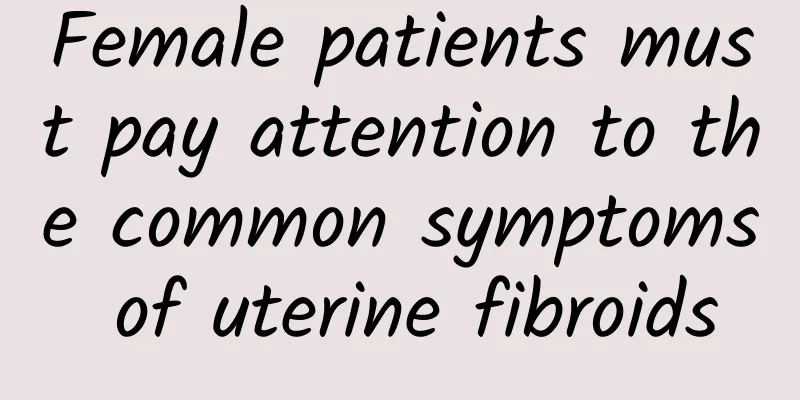Is it necessary to take hormones after three months of amenorrhea?

|
Whether you need to take hormones after three months of amenorrhea depends on the specific cause. It is recommended to see a doctor to determine the cause before deciding on a treatment plan. Amenorrhea may be related to endocrine disorders, polycystic ovary syndrome, thyroid dysfunction and other factors. Hormone therapy is one of the means, but it is not applicable in all cases. 1. Endocrine disorders are a common cause of amenorrhea. Abnormal function of the hypothalamus, pituitary gland or ovary may lead to hormonal disorders and affect the menstrual cycle. The hormone level can be assessed through the six hormone tests. If abnormalities are found, the doctor may prescribe estrogen, progesterone and other drugs to regulate the endocrine system and help restore menstruation. For example, oral contraceptives such as Diane-35 or progesterone capsules are often used to regulate the menstrual cycle. 2. Polycystic ovary syndrome PCOS is a common cause of amenorrhea in young women. PCOS patients are often accompanied by hyperandrogenism and insulin resistance, which leads to infrequent menstruation or amenorrhea. In terms of treatment, doctors may recommend the use of metformin to improve insulin sensitivity, or oral contraceptives to regulate hormone levels. Adjusting lifestyle, such as controlling weight and reducing high-sugar and high-fat diets, can also help improve symptoms. 3. Abnormal thyroid function may also cause amenorrhea. Hyperthyroidism or hypothyroidism can affect the menstrual cycle. Thyroid function tests can be used to make a clear diagnosis, and treatment requires adjusting medications based on thyroid hormone levels. For example, patients with hyperthyroidism can take methimazole, and patients with hypothyroidism need to supplement with levothyroxine sodium tablets. 4. Other factors such as mental stress, excessive weight loss, and strenuous exercise may also lead to amenorrhea. In these cases, hormone therapy is not the first choice, but it is necessary to start with lifestyle. Reducing stress, restoring a balanced diet, and moderate exercise can help restore menstruation. For example, increase foods rich in protein and healthy fats, such as eggs, fish, and nuts, and avoid excessive dieting. If you have amenorrhea for three months, you should seek medical attention immediately and determine the cause before deciding whether to use hormone therapy. Although hormone therapy is effective, it must be carried out under the guidance of a doctor and avoid self-medication. At the same time, adjusting your lifestyle also plays an important role in restoring menstruation. If amenorrhea is accompanied by other uncomfortable symptoms, such as sudden weight change, increased hair, etc., you should seek medical attention as soon as possible to rule out serious diseases. |
<<: What medicine is good for left adnexitis?
>>: Can I run if I have an enlarged cervix?
Recommend
What are the common types of cervical warts?
The classification of female cervical warts inclu...
Why do women get cervical erosion? Revealing the real cause of cervical erosion
Erosion, these two words are scary, they easily r...
What should be paid attention to in the treatment of adnexitis?
What are the points to pay attention to in the tr...
Talk to you about effective dietary treatments for bacterial vaginosis
In addition to conventional treatment, you can al...
Can I fill cavities during menstruation?
Tooth decay can be filled during menstruation, bu...
How to treat moderate cervicitis
How to treat moderate cervicitis? 1. Drug treatme...
What are the symptoms of severe cervical erosion?
Severe cervical erosion is the most serious type ...
Have you noticed the causes of cervical hypertrophy?
There are many reasons for cervical hypertrophy. ...
The diet of patients with vulvar leukoplakia should be understood in detail
Many patients suffer from vulvar leukoplakia, but...
Can uterine fibroids be cured directly? The best treatment for uterine fibroids
One day, my sisters came to my specialist clinic....
What causes menstrual odor?
What causes menstrual odor? The main causes of me...
What are the basic symptoms of irregular menstruation?
Menstrual disorders, also known as irregular mens...
What are the symptoms of Trichomonas vaginitis
The main symptoms of Trichomonas vaginitis are in...
What foods are suitable for patients with cervical warts?
Cervical warts are difficult to treat nowadays. W...
What are the common harmful consequences of cervical precancerous lesions?
We must actively grasp the hazards of cervical pr...









